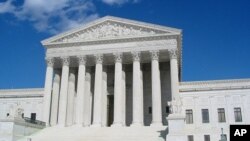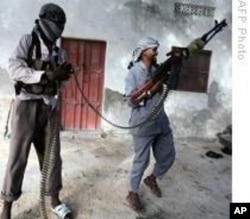The director of the International Justice Program at Human Rights Watch said yesterday’s U.S. Supreme Court ruling that a former Somali Prime minister can be sued for alleged torture and extrajudicial killings proves the United States is not a safe haven from justice.
In a ruling issued Tuesday, Associate Justice John Paul Stevens said former Prime Minister Mohamed Ali Samantar was not protected by diplomatic immunity, and can be sued.
Samantar, who now lives in Virginia, is being sued by members of Somalia's Isaaq clan, accusing him of commanding the country's military force to torture, kill, and arbitrarily detain clan members and their families.
Richard Dicker, director of the International Justice Program at Human Rights Watch, told VOA the decision is in line with the Alien Tort Claims Act that gives foreign nationals the opportunity to pursue such claims.
“It sounds to me that the Supreme Court has upheld the ability of individuals to charge foreign nationals in U.S. courts for acts committed off U.S. territory that don’t necessarily involved U.S. citizens. This would fall under the Alien Tort Claims Act that gives foreign citizens the opportunity to pursue such claims,” he said.
Former Liberian warring faction leader George Boley, Sr. is facing trial in New York for alleged visa violation and extra-judicial killings while he was the leader of the Liberian Peace Council, one of the many factions during Liberia's 14-year-old civil war.
Chucky Taylor, the son of former Liberian President Charles Taylor, was found guilty and sentenced in Florida for crimes he allegedly committed while he was head of his father’s government security force.
Dicker said these developments should serve notice that the United States is not a safe haven for alleged perpetrators of crimes against humanity.
“I think it suggests that the long arm of the law indeed has reached further than it had previously, and that’s a very good thing in limiting impunity for these horrific crimes. I hope it sends a message that those alleged perpetrators of such acts will find no safe haven within the United States,” Dicker said.
He said the recent arrests and prosecution of former alleged war crimes perpetrators in the United States means the United States is responding to an international trend to prosecute those accused of committing crimes in their respective countries.
“I think it may be part of this broader trend that we’ve seen with the establishment of a number of international courts and tribunals in the last 15 years, along with the use of national laws in a growing number of countries, to prosecute those accused of crimes committed off the territory of those countries against non-nationals. My inference from all this is the U.S. government is responding to what is an increasingly powerful trend to check the impunity for the commission of these kinds of crimes,” Dicker said.
Dicker said the message needs to go out that the United States is not a place that offers safe haven to those who may have been responsible for crimes against humanity.












